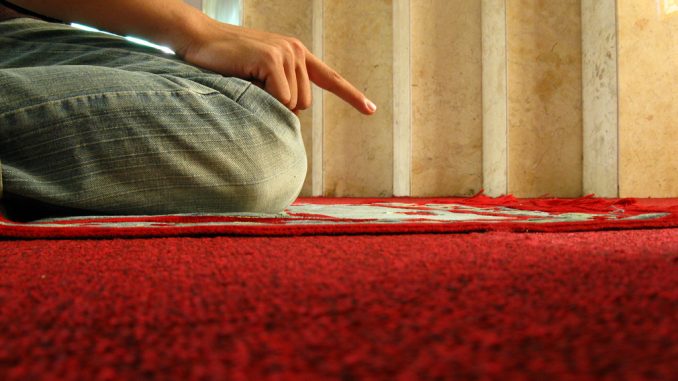
Nullifiers of the Fast
There are two categories of nullifiers of fast:
1 . nullifiers that entail redemption (qadaa).
2. nullifiers that entail redemption of the day or days invali-
dated (qadaa), and expiation, (kaffaarah).
Nullifiers that Entail Redemption (Al-Qada)
The first nullifiers are when the fast is rendered invalid and it
must be redeemed after Ramadan in a period extending over
eleven months, but no later than the next Ramadan.
The nullifiers are:
1. Intentionally eating or drinking by allowing food and
drink to travel through the mouth or nose to the stomach. When
this happens, the fast is nullified, even if it is just a bite or a sip.
On the other hand, if eating or drinking occurs unintentionally,
by mistake, and, for example, if a person forgetfully drinks af-
ter jogging, the fast is correct and resumes and no redemption
is necessary provided the faster does not continue to eat or
drink after he remembers. This ruling rests on the hadith nar-
rated by many reporters by way of Abu Hurairah (raa) that the
Prophet (saas) said:
“Whoever forgets -while fasting – and eats or drinks,
should stop immediately and resume or complete his
fast. For he has just been fed and quenched by Allah.”
(Agreed Upon)
The hadith indicates there is no need to worry if forgetfulness
overcomes a faster causing him or her to eat or drink. Besides,
Allah (SWT), in His mercy, justifies the person continuing to
fast because the sustenance that he took was a direct gift from
Allah, to the faster. The believer must be aware that this phe-
nomenon occurs usually in the first few days of the fast, before
the body and the mind adjust themselves to the new eating
schedule.
2. A substitute for food and drink is as good a nullifier of fast
as the real thing. By food substitute we mean two things:
Giving a faster a blood transfusion due to the loss of blood re-
sulting from an injury, invalidates the fast, the reason being
blood is a form of nourishment like food. Is not one of the rea-
sons for eating to get blood flowing within our system?
Feeding an individual through the stomach, or intravenously,
(through the veins), parenteral feeding (injecting nutrients into
the body) as a substitute for food and drink invalidates the fast.
Because this is substitute for food it takes its case in nullifying
the fast.
3. Inducing vomiting nullifies the fast. By this is meant, in-
tentionally causing the contents of the stomach to be ejected
through the mouth either by wringing the stomach, or palpating
the throat, or by smelling or looking at an emetic substance. In
this case, the fast should be redeemed later or after Ramadan,
but if the fast is a Sunnah fast, one has a choice to make it up
later or not. In a hadith related by Abu Hurairah (raa) the Mes-
senger of Allah (saas) said:
“Whoever is overcome by vomiting wouldn’t have to
make it up, but if vomiting is the result of inducement
(the fast is invalidated) and would have to be made up.”
(Ahmed)
It is important to say that the amount of the ejected contents,
whether it is little or much, has no effect on the ruling.
One of the reasons why induced vomiting invalidates fasting is
when the contents of the belly are thrown up, the body, which
is already short on nourishment, is further weakened. There-
fore, the Lawgiver as a mercy tells the believer to go ahead and
break this day, and make it up later.
However, no faster should break his fast because he or she
feels nausea, until the vomiting actually occurs.
4. Bleeding as a result of menstruation (known as hayd), or
post childbirth bleeding, (nifaas), nullifies the fast, even if it
occurs moments before sunset, and the iftar time. In this case,
the fast is no longer valid, and even if the woman tried to con-
tinue, it would still not be valid. It has been reported that the
Prophet (saas) said regarding menstruation,
“When a woman experiences her monthly period, she
will not pray or fast, but she shall redeem the fast after
Ramadan, but not Salaat.”
5. Ejaculation of semen, as a result of kissing, hugging, using
the hand (as in self-pollution) or using any object for a sexual
purpose for both men and women invalidates the fast because
this is shahawah, a sensuous or lustful act that nullifies the fast.
In a hadith Al-Qudsi, the Messenger of Allah (saas) has been
reported as saying referring to the faster:
“He who abstains from his food, his drink and his lust-
ful desires for My (Allah) sake.” (Al-Bukhari)
But if ejaculation occurs as result of a wet dream, or just unin-
tentional thinking that is devoid of actual acts or inducements,
the fast remains valid. Allah (SWT) will not hold one responsi-
ble for things randomly thought of which do not accompany
the deed. The Messenger of Allah (saas) said:
“Verily, Allah has pardoned my community, (Ummah)
what their souls entertain in so far as they do not do or
speak.” (Agreed upon)
This citation is referring to the case of thoughts borne in mind.
There are bad thoughts and good thoughts. The bad thoughts
and intentions are left unpunished so far as they are not ren-
dered into deeds, a blessing from Him (SWT). For were He to
hold us accountable for our thoughts, man would not have been
able to escape His wrath. On the other hand, a good thought is
rewarded regardless of whether the thought is being rendered
into deed or not.
In a hadith, related by Ibn Abbas (raa) the Messenger of Allah
(saas) conveying the Message from His Lord, says: “Allah has
written down the good deeds and the bad ones. Then He ex-
plained it (by saying that) he who has intended a good deed and
not done it, Allah records it with Himself as a full good deed,
but if he has intended it and has done it, Allah records it with
Himself as from ten good deeds, multiplied to seven hundred
times, or many times over. But if he has intended a bad deed
and has not done it, Allah records it with Himself as a full good
deed, but if he has intended it, and has done it, Allah records it
as one bad deed.” (Bukhari/Muslim)
